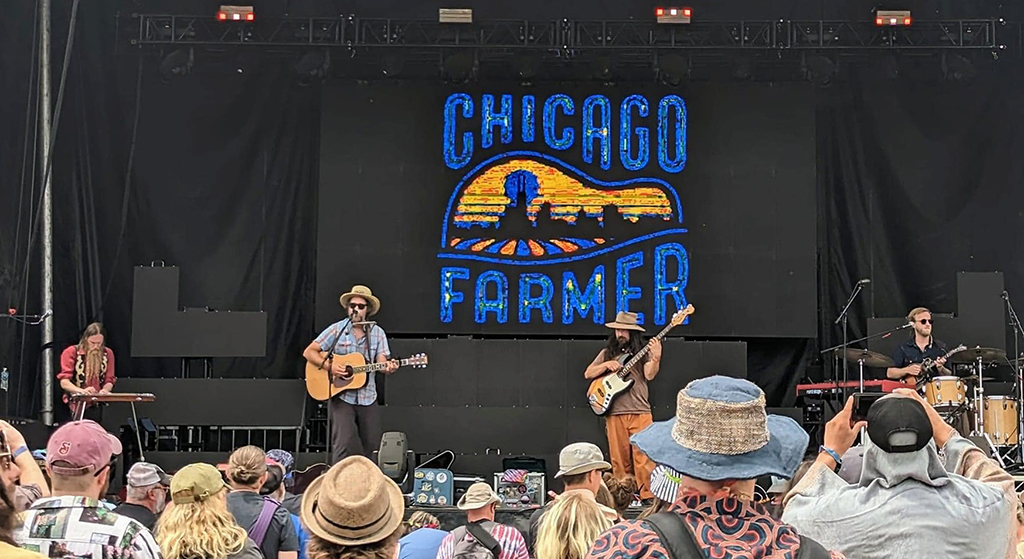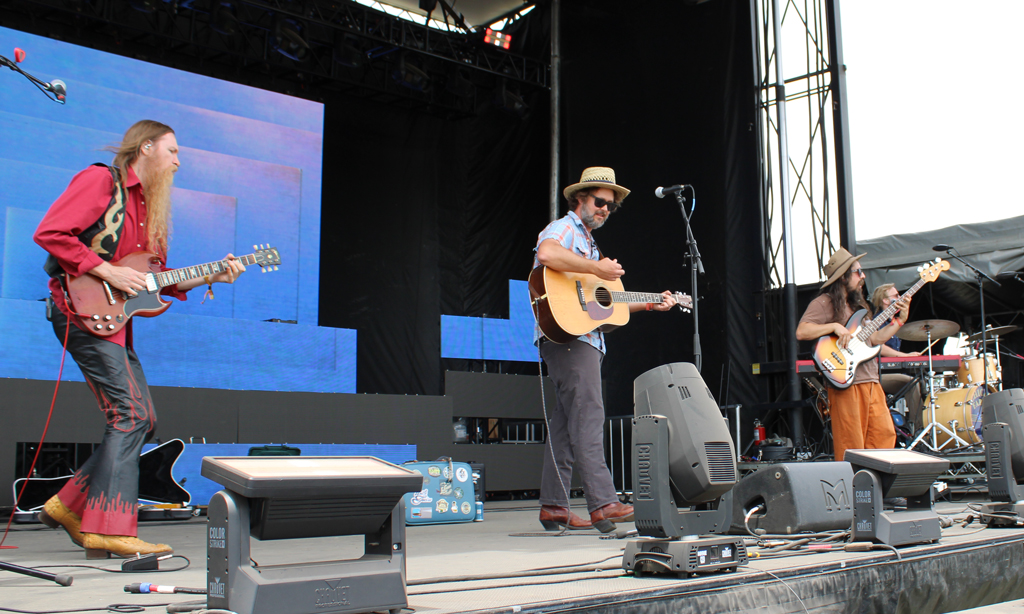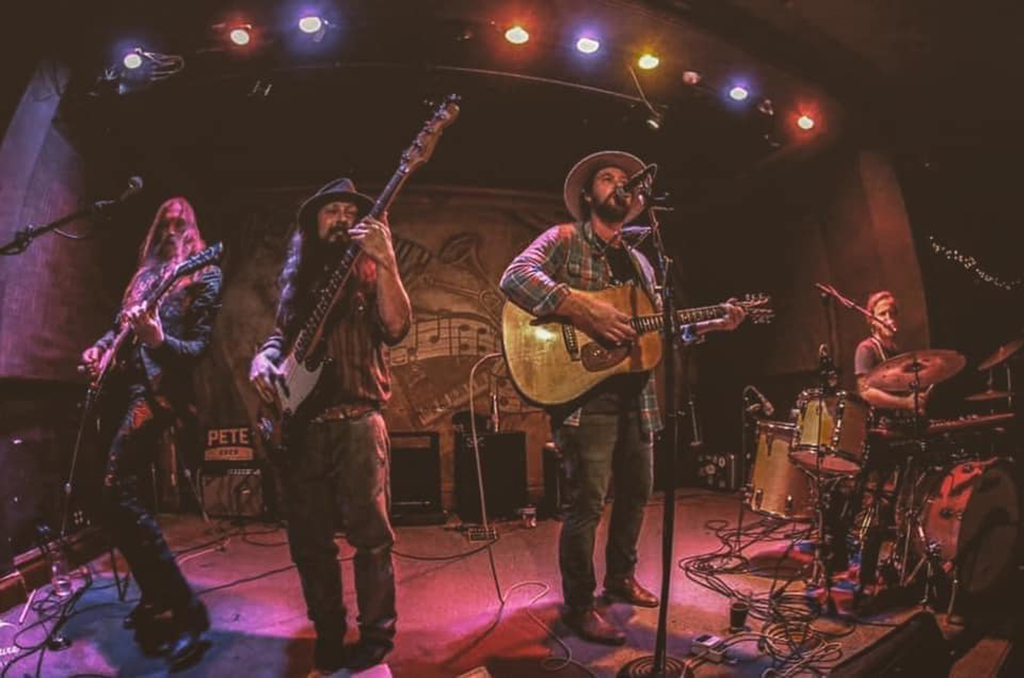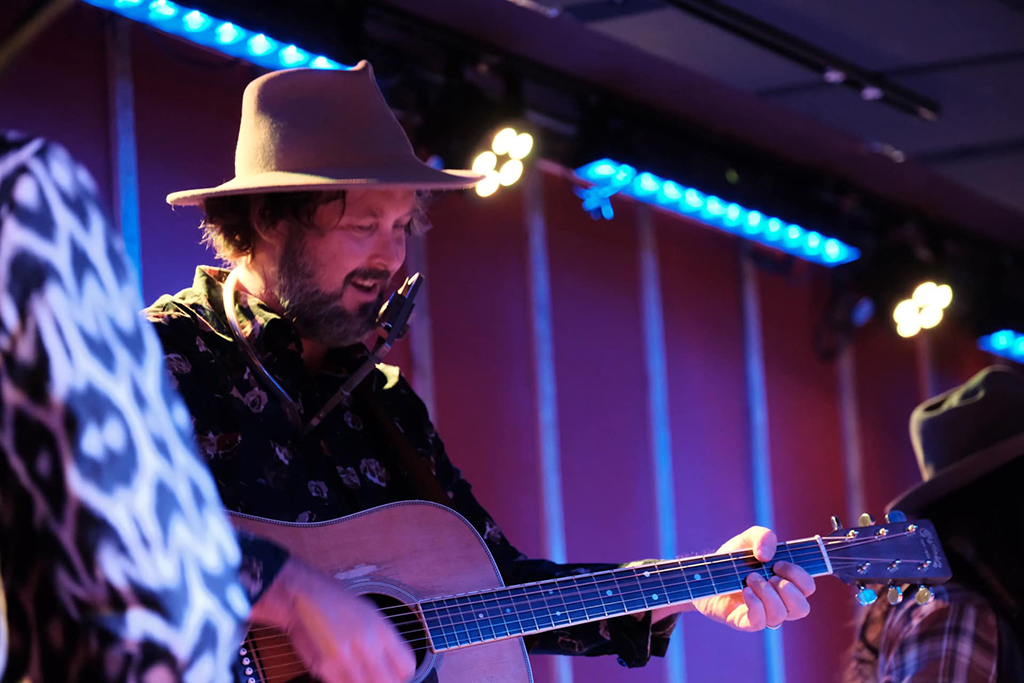From his humble roots in Delavan, Illinois, Cody Diekhoff’s (Chicago Farmer) journey into the world of music began with earnest simplicity. “I started out on a barstool with just my guitar and harmonica, playing songs I wrote in high school study hall,” he says. “I guess that’s where my love for storytelling in music really began,” recalled Diekhoff. “I had a lot of study halls and to use them wisely I started writing (poems). And then I wound up getting a guitar and started putting the writing in that poetry that I wrote in study halls into motion. I just needed something to do to fill the time and to keep me out of trouble,” said Diekhoff. “So it really started with the writing. And then that was kind of filled my emotional and mental need but I guess once I got the guitar that got the physical need, too. It just me and my guitar, and my voice and my harmonica for the first many, many years of my career.”
His transition from a one-man band to a full-fledged group (Chicago Farmer and the Fieldnotes) was born from a place of necessity and evolution. After spending 17 years living the solo troubadour lifestyle, he felt he was becoming too complacent, “going through the motions.” Today, he performs alongside a full band (The Fieldnotes), an evolution that’s led to both profound musical growth and a dramatic change in tour logistics. “It was just me and my wife traveling together in the beginning,” he reminisces. “Now we’ve got a minivan full of people on the road with us.”

The change came when Diekhoff was asked to perform as a band at a gig in Chicago. Initially offended, he then decided to recruit C-U musicians Charlie Harris and Cody Jensen, and the result was electrifying. From then on, it was clear that the solo troubadour had a new chapter unfolding. It was time to “switch this thing on its head and start doing something completely different,” said Diekhoff.
With the addition of other instrumentalists, including Jaik Willis on guitar and harmonies, the Chicago Farmer sound evolved. From the quiet attentiveness of listening rooms to lively venues where audiences dance, Diekhoff found himself living the best of both worlds. “I can turn around, do my solo thing, which is kind of my in my blood, then sometimes I can just get up with the band and just cut loose,” said Diekhoff.
Influenced by the likes of John Prine and Steve Goodman, Dierkhoff holds a deep respect for their music. Regarding Prine, Diekhoff recalls when his music first struck a chord with him, on a long trip. “I remember I was driving. I think I had to pull over a few times because the songs were so good. And I just kind of pulled to the side I thought about it, just certain lines in his songs that just kind of hit me and reminded me of home.”
Coined by his friend Edward David Anderson, “black dirt music” is a term that Diekhoff feels captures the earthiness of his songs. “It’s about the people and places that make up the heartland,” he muses. “It’s music that grounds you, makes you appreciate the simplicity and depth of everyday life. Whenever I’m solo I take scenic side roads as much as possible. I love just seeing so many different cool towns and places in the Midwest,” Diekhoff explains. These road trips, infused with the energy of different places, have played a profound role in shaping his artistry. He’s been deeply inspired by old venues and their history, considering the pioneers who performed on the same stages before him.

Diekhoff’s music connects deeply with the working class of small-town America. “My songs are about the folks I grew up with – the high school custodian who worked three jobs, my friends and family in the factories,” he shares. “I think that’s why people connect with it. It’s real; it’s about real people.”
Diekhoff’s songs often reflect the struggles of everyday people. When asked about balancing these struggles with resilience, he speaks of always finding the silver lining. The pandemic’s brutal impact on the music scene saw him adapting by live-streaming performances from the Rose Bowl Tavern. These live streams became a beacon of normalcy and creativity, both for Diekhoff and his fans. “So many people come up to me to say ‘thank you so much for doing those live streams from the Rose Bowl Tavern.’ It was something where I’ll just roll with the punches like we always do.” stated Diekhoff.
Diekhoff’s music is influenced by an array of artists and genres, from the angst of Nirvana and Pearl Jam to the country roots of Hank Williams and CCR. A special mention goes to Edward David Anderson’s early band, Brother Jed, who Diekhoff saw perform in Normal, Illinois, an experience he fondly recalls as the moment he decided to pursue music full-time.
The city of Chicago holds a significant place in Diekhoff’s life and music. Having spent several years there, Diekhoff says, “It was just like this explosion of creativity and culture and fun that this small-town kid was really looking for”. Even though he no longer lives in the city, it still feels like a second home, a place where he has written many songs, played countless shows and made lifelong connections. His wife made him fall in love with bluegrass music, but he also credits the time he spent in Chicago at the Old Town School of Folk Music for helping him truly appreciate folk and bluegrass, thanks to harmonica lessons purchased for him by his wife.

Since his cultural awakening in Chicago, Diekhoff has since found comfort in the slower pace of life in central Illinois. It has allowed him to strike a balance between being close to the big city’s vibrancy and the tranquility of having a “real yard for the dog”.
The future is bright and filled with music for Diekhoff, with new music in the pipeline. “We’re still scheduling it all, doing demos,” he shares. Despite being on the road frequently, the Rose Bowl Tavern is one place you’ll often find him, courtesy of its owner, Charlie. “As long as Charlie owns the Rose Bowl, I think this is probably our local spot to play. That’s what’s great about it.”
Chicago Farmer‘s story isn’t just about his music; it’s a testament to his profound love for this art, the roads he’s traveled, and the deep-rooted respect he has for the stage, the venue, and the history embedded within its walls. As his story continues to unfold, and the troubadour takes other unexpected paths, one can’t help but eagerly anticipate where the wind will take him next.
Come celebrate his birthday with him and all his musical friends at Rose Bowl this Saturday. Carrie Sue and the Woodburners are in support.
Chicago Farmer’s 45th Birthday Bash with Carrie Sue & The Wood Burners
Rose Bowl Tavern
106 N Race St
Urbana
Sa August 5th, 8 p.m.
$20 advance / $25 door








